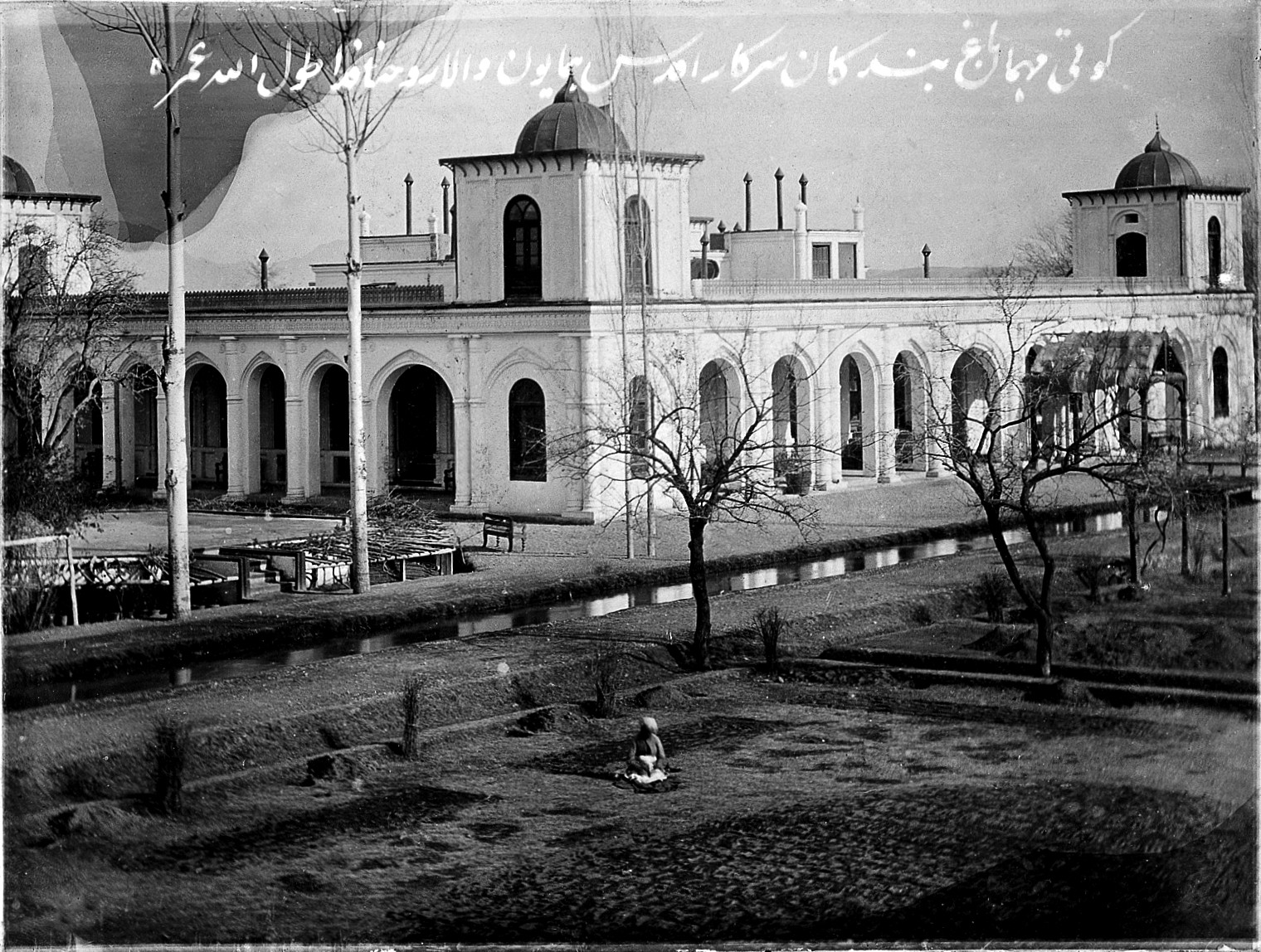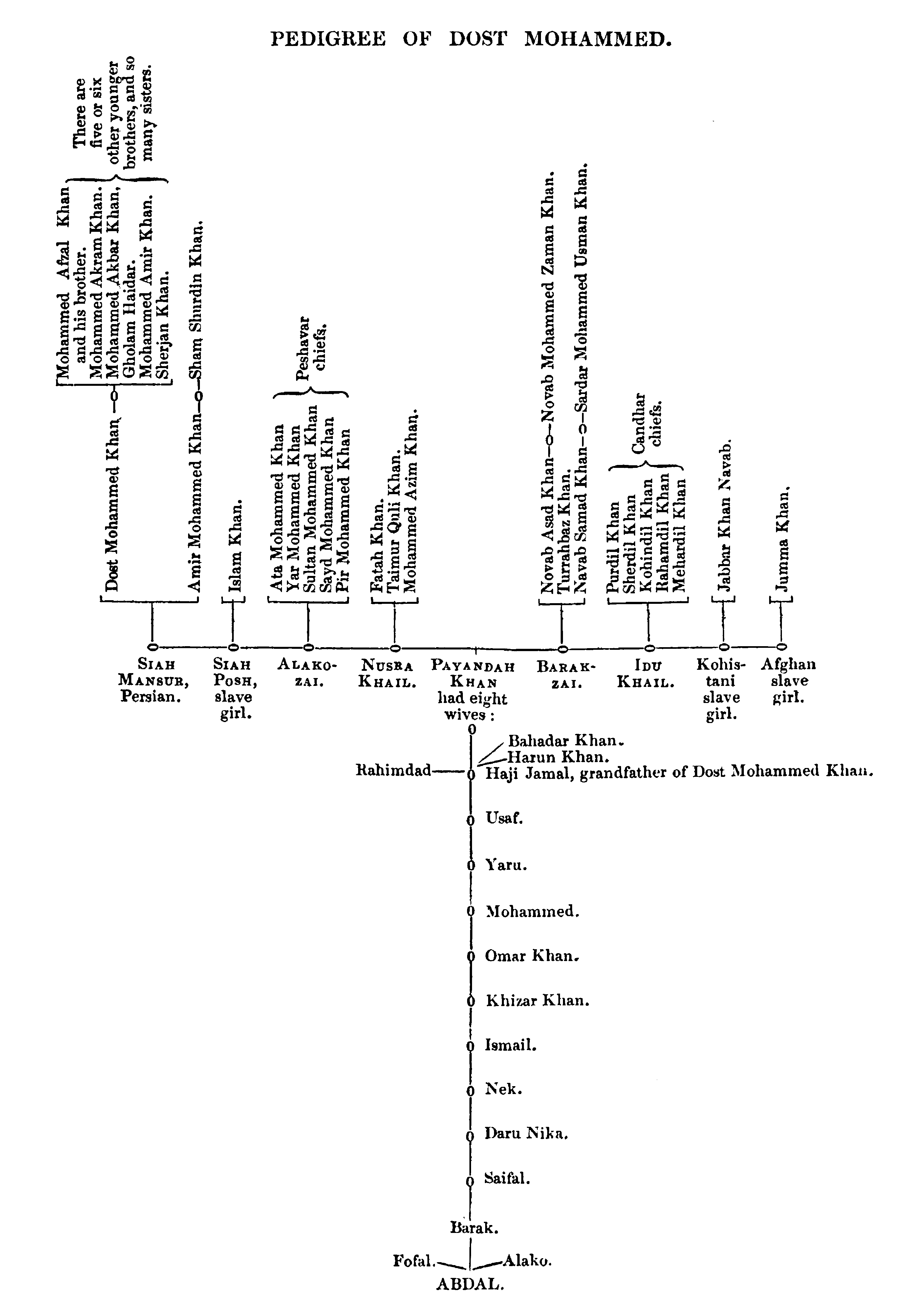|
Babo Jan
Mirmon Halima also known as Babo Jan or Bobo Jan (''fl.'' 1880), was an Afghan royal consort. She was married to Abdur Rahman Khan (r. 1880–1901). She was born to Amir Dost Mohammed Khan, the confidant and adviser of Abdur Rahman Khan. She was one of the many wives of the king. It was the custom of the monarch to have four official wives and a large number of unofficial wives as well as slave concubines in the harem of the royal Palace complex in Kabul. She was however his favorite wife, and came to influence him and the affairs of state. She acted as his adviser and was assigned by him the task to represent him on diplomatic missions as the mediator during clan and tribal conflicts, and as such made trips around Afghanistan with his permission to undertake such tasks. To act as a mediator in this way was acceptable for a royal woman, and had a predecessor in Zarghona Anaa a century before; but it was by no means a given thing, but rather testifies to the great confide ... [...More Info...] [...Related Items...] OR: [Wikipedia] [Google] [Baidu] |
Abdur Rahman Khan
Abdur Rahman Khan GCSI (Pashto/Dari: ) (between 1840 and 1844 – 1 October 1901) was Emir of Afghanistan from 1880 to his death in 1901. He is known for uniting the country after years of internal fighting and negotiation of the Durand Line Agreement with British India. Abdur Rahman Khan was the first child and only son of Mohammad Afzal Khan, and grandson of Dost Mohammad Khan, founder of the Barakzai dynasty. Abdur Rahman Khan re-established the writ of the Afghan government after the disarray that followed the second Anglo-Afghan war. He became known as ''The Iron Amir'' because his government was a military despotism. This despotism rested upon a well-appointed army and was administered through officials subservient to an inflexible will and controlled by a widespread system of espionage. The nickname, ''The Iron Amir'', is also associated due to his victory over a number of rebellions by various tribes who were led by his relatives. One source says that during his reign t ... [...More Info...] [...Related Items...] OR: [Wikipedia] [Google] [Baidu] |
Zarghona Anaa
Zarghona Anaa (died 1772), was an Afghan poet.M. Saed: Women in Afghanistan history She was the mother of Ahmad Shah Durrani (r. 1747–1772). She was married to Seman Khan. Her son conquered the Afghan throne in Kandahar in 1747. She was active as a poet, and enjoyed great respect for her ability as a poet and her strict adherence to the Pashtunwali moral code. She is known to have had great influence over the affairs of state through her son; she controlled Kandahar and acted as a mediator in Pashtun Pashtuns (, , ; ps, پښتانه, ), also known as Pakhtuns or Pathans, are an Iranian ethnic group who are native to the geographic region of Pashtunistan in the present-day countries of Afghanistan and Pakistan. They were historically re ... tribal conflicts in place of her son when he was on military campaign. References {{DEFAULTSORT:Zarghona Anaa Afghan women poets 18th-century Afghan people 1772 deaths Durrani dynasty 18th-century Afghan poets ... [...More Info...] [...Related Items...] OR: [Wikipedia] [Google] [Baidu] |
Afghan Royal Consorts
Afghan may refer to: *Something of or related to Afghanistan, a country in Southern-Central Asia *Afghans, people or citizens of Afghanistan, typically of any ethnicity **Afghan (ethnonym), the historic term applied strictly to people of the Pashtun ethnicity **Ethnic groups in Afghanistan, people of various ethnicities that are nationally Afghan *Afghan Hound, a dog breed originating in the mountainous regions of Afghanistan and the surrounding regions of Central Asia *Afghan (blanket) *Afghan coat *Afghan cuisine People * Sediq Afghan (born 1958), Afghan philosopher * Asghar Afghan (born 1987), former Afghan cricketer * Afgansyah Reza (born 1989), Indonesian musician also known as "Afgan" * Afghan Muhammad (died 1648), Afghan khan in modern day Russia * Azad Khan Afghan (died 1781), Afghan Commander and Ruler Places * Afghan, Iran, a village in Sistan and Baluchestan Province, Iran Other uses * Afghan (Australia), camel drivers from Afghanistan and Pakistan who came to the Au ... [...More Info...] [...Related Items...] OR: [Wikipedia] [Google] [Baidu] |
19th-century Afghan Poets
The 19th (nineteenth) century began on 1 January 1801 ( MDCCCI), and ended on 31 December 1900 ( MCM). The 19th century was the ninth century of the 2nd millennium. The 19th century was characterized by vast social upheaval. Slavery was abolished in much of Europe and the Americas. The First Industrial Revolution, though it began in the late 18th century, expanding beyond its British homeland for the first time during this century, particularly remaking the economies and societies of the Low Countries, the Rhineland, Northern Italy, and the Northeastern United States. A few decades later, the Second Industrial Revolution led to ever more massive urbanization and much higher levels of productivity, profit, and prosperity, a pattern that continued into the 20th century. The Islamic gunpowder empires fell into decline and European imperialism brought much of South Asia, Southeast Asia, and almost all of Africa under colonial rule. It was also marked by the collapse of the large S ... [...More Info...] [...Related Items...] OR: [Wikipedia] [Google] [Baidu] |
Barakzai Dynasty
The two branches of the Barakzai dynasty (, "sons of Barak") ruled modern day Afghanistan from 1823 to 1973 when the monarchy ended under Musahiban Mohammed Zahir Shah. The Barakzai dynasty was established by Dost Mohammad Khan after the Durrani dynasty of Ahmad Shah Durrani was removed from power. At the start of Barakzai rule in March 1823, the Afghans lost their former stronghold of Peshawar Valley to the Sikh Khalsa Army of Ranjit Singh at the Battle of Nowshera. The Afghan forces in the battle were supported by Azim Khan, half-brother of Dost Mohammad Khan. During the Barakzai era, Afghanistan saw much of its territory lost to the British in the south and east, Persia in the west, and Russia in the north. There were also many conflicts within Afghanistan, including the three major Anglo-Afghan wars and the 1928–29 civil war. History and background The Barakzai dynasty was the line of rulers in Afghanistan in the 19th and 20th centuries. Following the fall of the Dur ... [...More Info...] [...Related Items...] OR: [Wikipedia] [Google] [Baidu] |
Afghan Women Poets
Afghan may refer to: *Something of or related to Afghanistan, a country in Southern-Central Asia *Afghans, people or citizens of Afghanistan, typically of any ethnicity **Afghan (ethnonym), the historic term applied strictly to people of the Pashtun ethnicity **Ethnic groups in Afghanistan, people of various ethnicities that are nationally Afghan *Afghan Hound, a dog breed originating in the mountainous regions of Afghanistan and the surrounding regions of Central Asia *Afghan (blanket) *Afghan coat *Afghan cuisine People * Sediq Afghan (born 1958), Afghan philosopher * Asghar Afghan (born 1987), former Afghan cricketer * Afgansyah Reza (born 1989), Indonesian musician also known as "Afgan" * Afghan Muhammad (died 1648), Afghan khan in modern day Russia * Azad Khan Afghan (died 1781), Afghan Commander and Ruler Places * Afghan, Iran, a village in Sistan and Baluchestan Province, Iran Other uses * Afghan (Australia), camel drivers from Afghanistan and Pakistan who came to the Au ... [...More Info...] [...Related Items...] OR: [Wikipedia] [Google] [Baidu] |
19th-century Births
The 19th (nineteenth) century began on 1 January 1801 ( MDCCCI), and ended on 31 December 1900 ( MCM). The 19th century was the ninth century of the 2nd millennium. The 19th century was characterized by vast social upheaval. Slavery was abolished in much of Europe and the Americas. The First Industrial Revolution, though it began in the late 18th century, expanding beyond its British homeland for the first time during this century, particularly remaking the economies and societies of the Low Countries, the Rhineland, Northern Italy, and the Northeastern United States. A few decades later, the Second Industrial Revolution led to ever more massive urbanization and much higher levels of productivity, profit, and prosperity, a pattern that continued into the 20th century. The Islamic gunpowder empires fell into decline and European imperialism brought much of South Asia, Southeast Asia, and almost all of Africa under colonial rule. It was also marked by the collapse of the large S ... [...More Info...] [...Related Items...] OR: [Wikipedia] [Google] [Baidu] |



